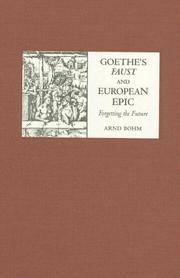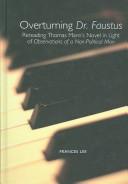| Listing 1 - 2 of 2 |
Sort by
|

ISBN: 9781571133441 1571133445 9781571136961 1571136967 Year: 2007 Publisher: New York Camden house
Abstract | Keywords | Export | Availability | Bookmark
 Loading...
Loading...Choose an application
- Reference Manager
- EndNote
- RefWorks (Direct export to RefWorks)
Goethe has long been enshrined as the greatest German poet, but his admirers have always been uneasy with the idea that he did not produce a great epic poem. A master in all the other genres and modes, it has been felt, should have done so. Arnd Bohm proposes that Goethe did compose an epic poem, which has been hidden in plain view: 'Faust.' Goethe saw that the Faust legends provided the stuff for a national epic: a German hero, a villain (Mephistopheles), a quest (to know all things), a sublime conflict (good versus evil), a love story (via Helen of Troy), and elasticity (all human knowledge could be accommodated by the plot). Bohm reveals the care with which Goethe draws upon such sources as Tasso, Ariosto, Dante, and Vergil. In the microcosm of the 'Auerbachs Keller' episode Faust has the opportunity to find 'what holds the world together in its essence' and to end his quest happily, but he fails. He forgets the future because he cannot remember what epic teaches. His course ends tragically, bringing him back to the origin of epic, as he replicates the Trojans' mistake of presuming to cheat the gods. Arnd Bohm is associate professor of English at Carleton University, Ottawa. Winner of the 2007 CHOICE Outstanding Academic Title Award.
Epic poetry, European --- European epic poetry --- European poetry --- History and criticism --- Goethe, Johann Wolfgang von, --- History and criticism. --- Cheating the gods. --- Elasticity. --- Epic poem. --- Epic. --- Faust legends. --- German hero. --- Goethe. --- Good versus evil. --- Helen of Troy. --- Knowledge. --- Love story. --- Mephistopheles. --- Trojans' mistake.

ISBN: 9781571133564 1571133569 9781571137012 9786612150555 1282150553 1571137017 Year: 2007 Publisher: New York Camden house
Abstract | Keywords | Export | Availability | Bookmark
 Loading...
Loading...Choose an application
- Reference Manager
- EndNote
- RefWorks (Direct export to RefWorks)
Thomas Mann's last major novel, 'Doktor Faustus,' revolves around the transformation of traditional German culture into Hitler's fascist Germany, a process that intrigues and confounds thinking people still today. Mann has always been considered an exemplary and authoritative portrayer of German culture, and his opinion on the rise of fascism carries considerable weight. Unfortunately, the novel has always been interpreted as saying the opposite of what it does in fact say. Frances Lee provides a radically new interpretation by relating in a detailed manner to the text of Doktor Faustus the arguments expressed by Mann in his 'Observations of a Non-Political Man' - a book of political essays published in 1918. This approach resolves many of the features that have been seen by critics as flaws or contradictions in the novel. Lee establishes what is actually happening in the novel in its historical setting, showing Mann's view of how the acceptance of fascism occurred and the determining role he attributed to the academic community in bringing about the disaster. Her book will be of interest to both amateur and professional students of Mann, particularly because it points to rich new directions for study. Frances Ann Ray Lee received the Ph.D. in German literature from the University of Toronto in 2005.
Mann, Thomas, --- Political and social views. --- マン・トオマス --- マン, トーマス --- Mann, Paul Thomas --- Mann, Thomas --- Man, Tomas, --- Man, Tʻomasŭ, --- Mān, Tūmās, --- Manas, Tomas, --- Mani, Tʻomas, --- Mann, Paul Thomas, --- Mann, Tomas, --- Mann, Tomasz, --- Thomas, Paul, --- Манн, Томас, --- מאן, תומאס --- מאן, תומאס, --- מאן, טאמאס --- מאן, טאמאס, --- מן, תומס --- מן, טומס --- מן, טומס, --- مان، توماس --- LITERARY CRITICISM / European / German. --- Academic community. --- Doktor Faustus. --- Faust legends. --- German culture. --- German hero. --- Good versus evil. --- Hitler's fascist Germany. --- Knowledge. --- Love story. --- Mephistopheles. --- National epic. --- Thomas Mann.
| Listing 1 - 2 of 2 |
Sort by
|

 Search
Search Feedback
Feedback About UniCat
About UniCat  Help
Help News
News